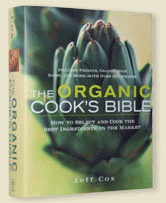Organic Gardening Magazine Is Now Organic Life
Organic Lifestyle Comments Off on Organic Gardening Magazine Is Now Organic Life
Organic Gardening magazine had its heyday in the decade of the 1970s, during the back-to-the-land phase of the emerging environmental movement. The two magazines people kept, rather than throw out, were National Geographic and Organic Gardening. Our readers (I say “our” because I worked on the magazine for the entire decade) were an amazingly loyal bunch—so much so that the lobby of our building at Rodale Press usually had a few tourists milling about, wide-eyed at the idea they were in the place where their handbook for organic living was written.
I always had the feeling that the organic idea—that the way to organize human life in all its aspects is to follow nature’s lead—had application far beyond the farm or garden. I still think that. And now, with the urging and blessing of Maria Rodale, the current CEO of Rodale Press, the boundaries have been pushed out, the walls confining the organic idea to the farm and garden have tumbled, and good old OG has become Organic Life.
I hope the new magazine looks at how that simple organic idea of following nature rather than twisting her arm for human purposes can be applied widely in all areas of human endeavor. What would it mean, for instance, to have an economic system built on respect for nature and a humble willingness to seek out her laws and rules and follow them? Would it lead us to the kind of income inequality we have in our capitalist system today? Should our way of life be thought of as an ecology, where every job has a benign purpose and fits into the economy the way plants and animals create a healthy ecosystem?
I wish Organic Life well. Along with its articles on food that sustains our bodies, I hope it provides plenty of food for thought. The supernova-like expansion of the organic idea into every facet of human life will be a fitting testament to the genius of Jerome Irving Rodale, Maria’s grandfather, the founder of the organic movement in America, the creator of Organic Farming & Gardening magazine, and a man vilified as a crazy quack while alive, but who was truly a visionary who planted a seed that has grown into a mighty tree. That tree has now borne fruit, and the seeds in those fruits have fallen, sprouted, and are now creating a climax forest ecosystem built on nature’s plan.
***
SYNGENTA TELLS BALDFACED LIE ABOUT ITS ATRAZINE HERBICIDE
“Syngenta, a Swiss chemicals company, produces one of America’s most popular herbicides. It is called atrazine, and 73.7 million pounds of the chemical compound were applied in the United States in 2013. It was used on more than half of all corn crops, two-thirds of sorghum and up to 90 percent of sugar cane,” writes Danny Hakim in The New York Times..
The weed killer is banned as a pesticide in the European Union as well as in Switzerland over concerns that it is a groundwater contaminant. Syngenta, however, did not get the memo. Hakim reports that even though the EU banned atrazine over a decade ago, the company has long insisted that the pesticide is not banned. On one corporate website, Syngenta points to anti-atrazine activists who claim that “atrazine is banned in the European Union. This is patently false.”
Another Syngenta-backed site, “Saving the Oasis,” also blames “anti-atrazine activists.” And another such site, AGSense, says, “We’ve known it all along, and now you know it too: Atrazine is not banned in the European Union.” And the company has repeated its assertion to reporters. “It is not banned,” Ann Bryan, a spokeswoman for the company, told Hakim in an email. .
“The use of atrazine as an herbicide or pesticide is banned in the E.U.,” Mikko Vaananen, a spokesman for the European Chemicals Agency, stated in an email. European Union government documents, from formal filings to informal newsletters, also use the term “banned.”
Scores of chemicals that are banned or tightly restricted in the European Union are allowed in the United States. One recent analysis by the Center for International Environmental Law, a Washington-based advocacy group, found 82 instances of pesticides allowed in the United States but barred or restricted in Europe. This disparity can make selling products on one side of the Atlantic that are banned on the other uncomfortable, though few companies have tried a semantic maneuver quite like Syngenta’s.
***
GOODBYE NATIONAL SOVEREIGNTY
A provision of the Trans-Pacific Partnership (TPP) “trade” deal called Investor-State Dispute Settlement (ISDS) would allow Monsanto to sue any nation bound by the TPP contract (Australia, Brunei, Canada, Chile, Japan, Malaysia, Mexico, New Zealand, Peru, Singapore, the United States, and Vietnam) for potential lost profits as a result of GMO or pesticide regulations. Have GMO labeling or cultivation bans within your borders? Get ready to go to court…Monsanto’s court, that is. With ISDS, Monsanto can take its case before an international corporate court where corporate lawyers are the judges. And its rulings can’t be challenged in the defending nation’s courts.
***
RHODE ISLAND GMO LABELING LAW MOVES FORWARD
Rhode Island moves forward with legislation for mandatory GMO labeling! Representatives Canario, Hull, Edwards, Bennett, and Abney have introduced H5197 that will label raw and packaged foods that have been genetically engineered.
***
BIG INCREASE IN INFLAMMATORY BOWEL DISEASE IN KIDS
Got GMO belly? Without GMO labeling, there is no traceability, no accountability, and no liability. In the largest study to date, researchers in Ohio found an alarming increase in children with inflammatory bowel disease during the last decade in the United States. This increasing trend was present in each age category and across all geographic regions (Northeast, Midwest, South and West). The peer reviewed study was published in the Journal of Investigative Medicine.
Interestingly, researchers studying farm animals fed GMO corn and soybeans have found a high incidence of inflamed stomachs and bowels in swine. A control group of pigs fed organic feed had no such inflammatory disease. Pigs are noted for having digestive systems remarkably like humans.
***
SCOTT’S SELLING ROUNDUP READY GMO GRASS
Scott’s has released Roundup Ready GMO Kentucky Bluegrass into our environment. Employees have started planting it at their homes. Like most other GMOs, this is just another way to sell more Roundup. Not only on our food but now in our yards where our children play and our pets run.
***
ARE BIG ORGANIC CORPORATIONS PROFITEERING?
Mark Kastel, Senior Farm Policy Analyst at the Cornucopia Institute in Wisconsin sent us the following email:
With 80 percent of organic eggs coming from giant Confined Animal Feeding Operations (CAFOs), factory farms with as many as 18,000 head of cattle producing an increasing percentage of the organic milk supply, and an estimated 50 percent of organic corn and 75-90 percent of organic soybeans being imported, it seems that the public corporations involved in organics have used this dynamic to profit very handsomely at the expense of U.S. family-scale farmers.
Due to the generosity of the Jessie Smith Noyes Foundation and a couple of our major individual donors, Cornucopia owns stock in all of the public companies that are heavily involved in organics so we can monitor them and participate in their governance, with others, as activist shareholders. We have to assume that privately held corporations, and the giant agribusinesses that own so many organic brands (Kellogg’s, General Mills, Smucker’s, etc.), are profiting as well.
There’s nothing wrong with profit. But why should the profit margins for organic brands be larger than margins for conventional food? They certainly need to cover their increased costs (and organic ingredients and handling are more expensive than conventional). But extra margins appear to be profiteering at the expense of consumer goodwill.
How many more consumers could afford organic food if margins, and corporate profits, were at industry averages?
And now, these companies, in the guise of the industry’s lobby group, the Organic Trade Association (OTA), want to institute a “check-off” (tax on industry participants, including family farmers).
The OTA in the past failed at fundraising to support their own research initiative, The Organic Center. Now they want a federally mandated tax that will generate an estimated $40 million a year.
Don’t you think the corporations themselves, awash in profits, could leave the family farmers, who have overwhelmingly rejected the scheme, out of this shakedown?
###












